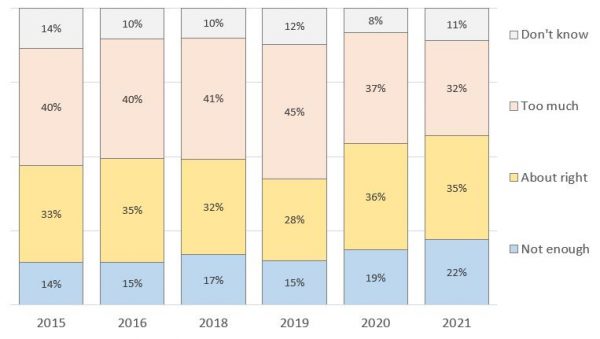The Development Policy Centre regularly surveys Australians’ views on foreign aid. We ran our most recent survey just prior to the 2021 Federal Budget – a budget that saw Australian aid spending cut. The results of our recently completed survey show that cuts were not what most Australians wanted.
We’ve asked questions about various aspects of aid giving over the years. But we have kept one question constant since 2015: does the government give too much aid, too little aid, or about the right amount? It’s a simple question. And the question of most relevance on budget night. Of all the questions we’ve asked, it has also been the one that has returned the least favourable responses. A clear majority of Australians inevitably say they support Australia giving some aid overseas. And they usually say they want aid used to help other countries rather than to further Australia’s commercial or geostrategic interests. (See the findings in this article.) But when we’ve asked whether Australia gives too much or too little aid, the most common response has been “too much”. Or at least, that used to be the most common response. The figure below shows the results of our 2021 survey, alongside surveys from previous years.
Australian attitudes to government aid spending over time
As you can see, in 2021, for the first time, the share of Australians who think Australia is giving too much aid is lower than the share who think aid is at about the right amount. The difference between the “too much” group and the “about right” group isn’t quite statistically significant, so we can’t be completely confident the gap between the two groups is real. We can be very confident, however, that fewer Australians think Australia gives too much aid (32%) than think it either gives the right amount or gives too little (57%). This difference is, it hardly needs to be stated, statistically significant.
To put it another way, most Australians didn’t think aid needed to be cut last week.
What’s more, public sentiment seems to be changing. The appetite for cuts is waning, and the small group of Australians who think their country should be doing more appears to be growing. You can see this if you compare the 2018 results with the 2021 results. More people now think Australia gives too little aid: 22% compared to 17%. Fewer people think Australia gives too much aid: 32% compared to 41%. (Both of these differences are statistically significant.)
In the last few years, Australians appear to have become more supportive of aid. Why is this the case? Among the possible explanations, COVID-19 is an obvious frontrunner. The timing is right and results from an experiment we ran last year fit the explanation too. The results of that experiment also suggested COVID-19’s effects on support for aid come primarily via concern for the welfare of people in developing countries, not a desire to protect Australia.
Regardless of exactly why attitudes are changing, the crucial point is that they are on the move. In these, the COVID years, Australia has a choice: it can close itself off from the needs of poorer countries, or it can do its fair share as part of international efforts to help. The aid cuts in the May budget signalled a retreat from global engagement. On the basis of our evidence, retreat is a path that fewer and fewer Australians want to take.
Technical notes
All the surveys presented here involved nationally representative samples of Australians. Sample sizes have varied between surveys. Starting in 2018, all surveys were carried out by the same survey company, minimising the risk that so-called ‘house effects’ stemming from differences between survey companies have driven trends. All surveys contained the same question, eliminating the possibility that changes in question wording have driven trends. This question contained basic information on the share of federal spending devoted to aid, so as to enable people to offer informed views. Although, for what it’s worth, it seems to be the case that providing Australians with accurate information on aid volumes does not change opinion much. Details on surveys, question wording, and results can be downloaded here.
Disclosure
The Development Policy Centre’s research on public opinion about aid is undertaken with the support of the Bill & Melinda Gates Foundation. The views expressed here are those of the authors only.




Leave a Comment